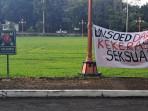Kunci Jawaban
Kunci Jawaban Bahasa Inggris Kelas 8 SMP Kurikulum Merdeka: Halaman 117-118
The stories of The Ugly Ducklings and The Elephant and Friends are imaginative stories
Penulis: Tribun Network | Editor: Rifatun Nadhiroh
2. Complication
- Example:
"Can I please stay here?" asked the Ugly Duckling politely.
"Why do we care?" said one of the chickens.
"Go away," exclaimed the other.
The Ugly Duckling walked with his head down in shame. He was sad.
The dog chased the Ugly Duckling. "Woof! Woof!" The Ugly Duckling was scared. The dog sniffed and sniffed at him, then turned away. "I am too ugly even for the big hungry dog to want," said the Ugly Duckling. He felt heartbroken.
"Can I please stay here?" asked the Ugly Duckling nicely.
"Why do I care?" replied the rude cow. She then yelled, "Moo! Go away!" Once again, the Ugly Duckling walked away with his head down. He felt heartbroken.
- Detail:
Problem: The chickens sent him away the dog turned away from him the cow sent him away
Chapter 2 Kindness Begins With Me
Pada bab ini, siswa belajar mengekspresikan tentang perasaan, sifat dan perilaku karakter dalam cerita.
Karakter dalam cerita-cerita tersebut adalah berbagai macam binatang, jadi ceritanya tidak nyata atau imajinatif atau cerita rakyat.
(In this chapter, students learn to express the feelings, traits and behaviors of the characters in the stories. The characters in the stories are various animals, so the stories are not real or imagined or imaginative).
Some vocabulary in this chapter:
begin (base form)/began (past form): mulai
hatch (base form)/hatched (past form): menetas
shake (base form)/shook (past form): menggoyangkan
wait (base form)/waited (past form): menunggu
wobble (base form)/wobbled (past form): berjalan gemetar dan
tidak stabil
wings: sayap
shy: malu-malu
warm: hangat
gracefully: dengan anggunnya
once upon a time: pada suatu hari
at last: akhirnya
calm (base form)/calmed (past form): menenangkan
hear (base form)/heard (past form): mendengar
paddle (base form)/paddled (past form): mendayung
brave: berani
different: berbeda
mean: jahat
nice: baik
pleased: senang
rude: kasar
sad: sedih
ugly: buruk rupa
weak: lemah
proudly: dengan bangga
slowly: secara perlahan
suddenly: tiba-tiba
timidly: takut
the last spot: tempat terakhir
river: sungai
in chorus: berbicara bersamaan
Pada teks cerita kita menggunakan kata kerja bentuk lampau untuk membicarakan kejadian di masa lampau dalam sebuah cerita. Kita menggunakan kata kerja ini untuk:
| Kunci Jawaban Bahasa Indonesia Kelas 10 Halaman 140: Membahas Tentang Kalimat Perbaikan |

|
|---|
| Kunci Jawaban Bahasa Indonesia Kelas 10 SMA Kurikulum Merdeka, Halaman 206 Sampai 207 |

|
|---|
| Kunci Jawaban Bahasa Indonesia Semester 2 Kelas 11 Halaman 134, Membahas Tentang Membuat Cerpen |

|
|---|
| Kunci Jawaban Bahasa Indonesia Kelas 11 SMA Halaman 136 : Cerdas Cergas Berbahasa dan Bersastra |

|
|---|
| Kunci Jawaban Bahasa Indonesia Kelas 10 SMA Halaman 177, Membahas Biografi Tokoh Inspiratif |

|
|---|
















Isi komentar sepenuhnya adalah tanggung jawab pengguna dan diatur dalam UU ITE.